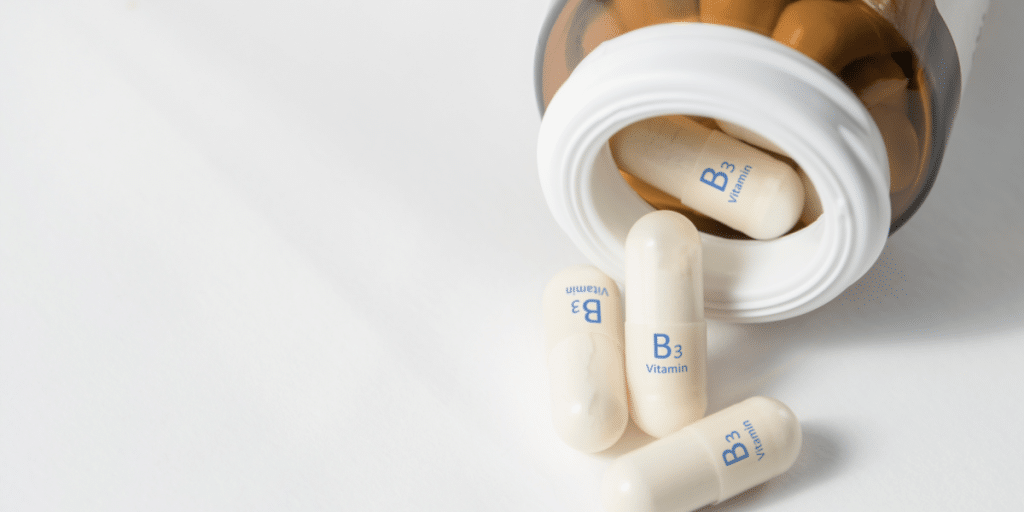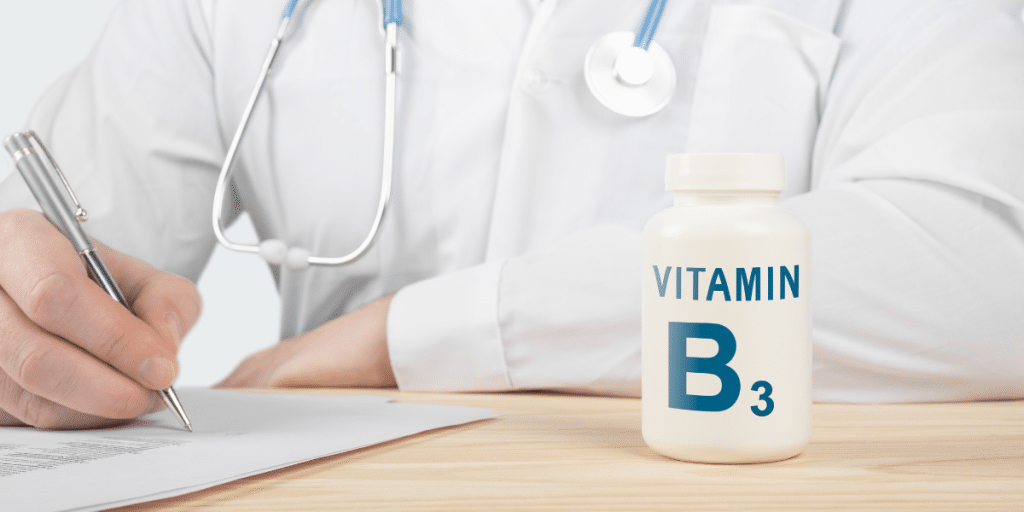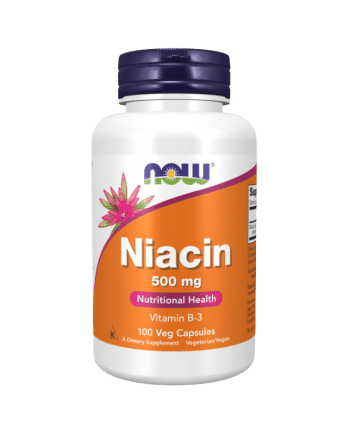Are you feeling more tired than usual? Are you struggling to maintain clear skin or manage stress? You might be lacking vitamin B3! Also known as Niacin, this essential vitamin plays a crucial role in energy production, cognitive health, skin health and heart health. In this blog, we’ll discuss the proven benefits of vitamin B3, how it supports your body and the best ways to add it to your daily routine.
What is Vitamin B3?
Vitamin B3 is one of those essential vitamins that plays a role in keeping us energized and healthy. It’s a water-soluble B vitamin, which means we need to replenish it daily through our diet or supplements since our body doesn’t store it.
Vitamin B3 comes in three forms: nicotinic acid, niacinamide, and inositol hexanicotinate. Each has its unique perks, like helping our cells make energy, supporting DNA repair, and even helping with fat metabolism.
Getting enough Niacin daily is essential. You can find it in many foods, like poultry, fish, nuts, and whole grains. And if you’re looking for an extra boost, niacin supplements are readily available from Boost Malta.

What are the Proven Benefits of Vitamin B3?
Are you curious about how Niacin can benefit you? Here are some of the most researched perks of getting enough vitamin B3 in your routine:
Heart Health Support
Niacin has been found to positively impact cholesterol levels, which is a big deal for heart health. Studies show that it can help raise “good” HDL cholesterol and lower “bad” LDL cholesterol. According to research published in the Journal of Clinical Lipidology, it can also reduce LDL cholesterol and triglycerides—two factors that influence heart disease risk.
Boosts Brain Health
Vitamin B3 is good for proper brain function and cognitive health. Niacin deficiency has actually been linked to mental health conditions, including dementia and cognitive decline. Studies suggest that adequate niacin intake may help protect against age-related cognitive issues and support memory and focus. A study in the Journal of Alzheimer’s Disease found that people with higher niacin intake had a lower risk of Alzheimer’s and other cognitive impairments.
Promotes Skin Health
Vitamin B3 is widely used in dermatology, particularly niacinamide, which has been shown to support skin health by reducing redness, inflammation, and hyperpigmentation. Research suggests that topical and oral niacinamide can help improve skin hydration and reduce the appearance of fine lines and wrinkles. In a clinical trial, the British Journal of Dermatology noted that niacinamide significantly improved skin barrier function and decreased water loss in participants.
Because of its beauty-boosting nature, we decided to add vitamin B3 to our Beauty Collagen powder.
Boosts Energy Levels and Metabolism
Niacin plays a vital role in cellular energy production. As part of the B-complex family, it helps enzymes that convert carbohydrates, fats, and proteins into usable energy. This is especially important for athletes or individuals with high energy demands. According to a study in the European Journal of Clinical Nutrition, Niacin helps improve endurance and reduce fatigue by supporting the body’s metabolic functions.

Reduces Inflammation
Niacin also has anti-inflammatory properties, making it beneficial for individuals with conditions such as arthritis. Studies suggest that niacinamide can reduce inflammation and oxidative stress in the body. In a study published in Inflammation Research, participants with osteoarthritis who took niacinamide supplements reported reduced inflammation and improved joint mobility.
What is the Best Way to Take Niacin?
For most people, a balanced diet should supply adequate amounts of Niacin. However, individuals with specific health needs or deficiencies may benefit from niacin supplements. Niacin supplements come in different forms: immediate-release, extended-release, and sustained-release. Each has its absorption rate and side effects, so consult with a healthcare provider to find the best option for your needs.
We recommend taking Niacin with meals to improve absorption and reduce common side effects like flushing—a temporary warmth or redness in the skin that many people experience. Extended-release formulas are designed to reduce flushing but may still affect the liver with prolonged use, so regular liver function monitoring is recommended if you’re taking Niacin in higher doses.
Are There Any Vitamins or Medications That Cannot Be Taken with Vitamin B3?

While vitamin B3 is generally safe, certain medications and vitamins may interact with it:
- Statins: Niacin can enhance the cholesterol-lowering effects of statin medications but may increase the risk of muscle damage when used together. Always consult your doctor if you plan to use both.
- Antidiabetic Medications: Niacin may increase blood glucose levels, which can affect individuals taking diabetes medications. If you have diabetes, it’s important to monitor your blood sugar levels closely while taking Niacin.
- Vitamin C: Large doses of niacin and vitamin C together can increase the acidity of the stomach and potentially cause digestive upset. If you need both, consider taking them at different times of the day.
Conclusion
Vitamin B3, or Niacin, offers an array of health benefits. With numerous studies backing its effectiveness, Niacin is a valuable addition to a well-rounded wellness routine. However, it’s essential to consider potential interactions and consult with a healthcare provider, especially if taking other medications or supplements. For those looking to boost their overall health, Niacin is a versatile and beneficial option worth exploring.
FAQs
What foods contain high levels of vitamin B3?
You can get Niacin from foods like poultry, fish, lean meats, nuts, and whole grains. Adding these to your diet can help you reach your daily Niacin needs naturally.
Can Niacin help with energy levels?
Yes! Niacin is essential for converting food into energy, helping to maintain stamina and reduce fatigue throughout the day.
Why does Niacin cause a flush?
Niacin flush is a temporary redness and warmth in the skin that some people experience when taking Niacin. It’s generally harmless and it usually goes away without treatment in 1–2 hours. If you prefer to avoid the flush, you can try niacinamide, an alternative form of vitamin B3. Unlike Niacin, niacinamide doesn’t cause flushing but still offers many of the same benefits for overall health.

